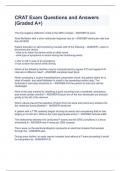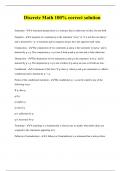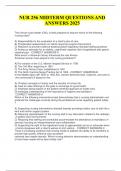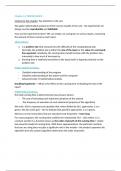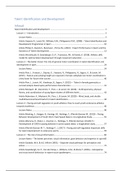Cells To Systems - Nervous System
Overview Of The Nervous System
The Nervous System:
2 Types:
1. Central Nervous System (CNS)
2. Peripheral Nervous System (PNS)
Central Nervous System (CNS):
Functions to send rapid messages from 1 part of the body to another
Includes the brain and spinal cord
Peripheral Nervous System (PNS):
Consists of nerves and ganglia outside of the brain and spinal cord
3 Systems:
1. Somatic - Communicates information about sensory (skin) and motor
2. Autonomic - Things that you do automatically (consists of sympathetic and parasympathetic nervous system)
3. Enteric - System of neuronal networks. To do with the guts
Cells Of The Nervous System:
Systems - Made up of lot of cells that go together to make organs which then make the systems
Glial Cells - Accessory cells that help the neurons do what they need to do e.g. astrocytes, ependymal cells,
oligodendrocytes, microglia, neurons
Neurons and glia can be found in the nervous system
Glial cells are helper cells
5 Types Of Glial Cells:
1. Astrocytes
2. Ependymal cells
3. Oligodendrocytes
4. Microglia
5. Neurons
Astrocytes:
Majority, neurotransmitter regulation, synaptic function, etc
Helps neurons with communication jobs
Helps clear up neurotransmitters
Helps regulating synapses
Helps with synaptic transmission
Helps with transmission
Not sending signals themselves
1
, Cells To Systems - Nervous System
Ependymal Cells:
Found on the edges of the brain
Produces and moves cerebrospinal fluid (CSF) (brain and spinal cord sit in this fluid)
Protects the brain and cushions it
Helps to move around wastes Produces CSF
Oligodendrocytes:
Main function is myelination
Found in the CNS
Myelination of axons
Helps provide myelination coating around the neurones to help speed up synaptic transmission
along an axon
Microglia:
Brain macrophages (type of immune cell) Microglia = green
Functions to clear dead cells and microbes to protect the brain from any invading pathogens
Neurons:
Messenger cells that are part of the NS
Allows communication with the rest of the body
Roberta de Ceglia et al. recently published a paper in nature that shows that certain astrocytes are
capable of releasing glutamate at a speed and manner comparable with synaptic transmission. Could
have implications for pathologies such as epilepsy, Alzheimer’s and Parkinson’s Disease.
The Neuron:
Most neuronal cells send the signal from cell body end to the axon terminal end (always this direction)
Nucleus is situated in the cell body
The signal will come in through dendrites, get sent along the axon and will come out the axon terminals
Ion Concentration At Rest:
Permeability - How freely it can pass from the inside to the outside (whether or not something can pass)
Sodium:
High concentration on the outside than inside
Not very permeable
Potassium:
Low concentration on the outside than inside
Very permeable
2
Overview Of The Nervous System
The Nervous System:
2 Types:
1. Central Nervous System (CNS)
2. Peripheral Nervous System (PNS)
Central Nervous System (CNS):
Functions to send rapid messages from 1 part of the body to another
Includes the brain and spinal cord
Peripheral Nervous System (PNS):
Consists of nerves and ganglia outside of the brain and spinal cord
3 Systems:
1. Somatic - Communicates information about sensory (skin) and motor
2. Autonomic - Things that you do automatically (consists of sympathetic and parasympathetic nervous system)
3. Enteric - System of neuronal networks. To do with the guts
Cells Of The Nervous System:
Systems - Made up of lot of cells that go together to make organs which then make the systems
Glial Cells - Accessory cells that help the neurons do what they need to do e.g. astrocytes, ependymal cells,
oligodendrocytes, microglia, neurons
Neurons and glia can be found in the nervous system
Glial cells are helper cells
5 Types Of Glial Cells:
1. Astrocytes
2. Ependymal cells
3. Oligodendrocytes
4. Microglia
5. Neurons
Astrocytes:
Majority, neurotransmitter regulation, synaptic function, etc
Helps neurons with communication jobs
Helps clear up neurotransmitters
Helps regulating synapses
Helps with synaptic transmission
Helps with transmission
Not sending signals themselves
1
, Cells To Systems - Nervous System
Ependymal Cells:
Found on the edges of the brain
Produces and moves cerebrospinal fluid (CSF) (brain and spinal cord sit in this fluid)
Protects the brain and cushions it
Helps to move around wastes Produces CSF
Oligodendrocytes:
Main function is myelination
Found in the CNS
Myelination of axons
Helps provide myelination coating around the neurones to help speed up synaptic transmission
along an axon
Microglia:
Brain macrophages (type of immune cell) Microglia = green
Functions to clear dead cells and microbes to protect the brain from any invading pathogens
Neurons:
Messenger cells that are part of the NS
Allows communication with the rest of the body
Roberta de Ceglia et al. recently published a paper in nature that shows that certain astrocytes are
capable of releasing glutamate at a speed and manner comparable with synaptic transmission. Could
have implications for pathologies such as epilepsy, Alzheimer’s and Parkinson’s Disease.
The Neuron:
Most neuronal cells send the signal from cell body end to the axon terminal end (always this direction)
Nucleus is situated in the cell body
The signal will come in through dendrites, get sent along the axon and will come out the axon terminals
Ion Concentration At Rest:
Permeability - How freely it can pass from the inside to the outside (whether or not something can pass)
Sodium:
High concentration on the outside than inside
Not very permeable
Potassium:
Low concentration on the outside than inside
Very permeable
2

